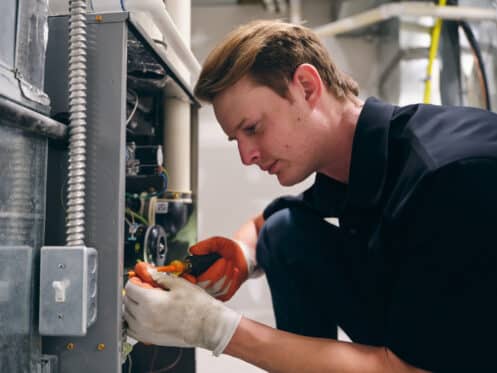Any time you need to replace the heating system in your home, it’s important that you give careful consideration to which type of new heating system you want to install. Most people just choose to install the same type of system as whatever they currently have. While this isn’t necessarily a bad choice in every situation, it also isn’t always going to be your best option. Instead, you may want to opt for a heating conversion. Here we’ll explain all you need to know about what a heating conversion is, what your various options are and what benefits a conversion can provide.
What Is a Heating Conversion?
A heating conversion often refers to replacing any type of heating system that runs on fossil fuels, such as a gas, oil or propane furnace, with an electric heat pump system. However, it can also just mean converting from any one type of heating system to another. For instance, it can mean switching the heating system in your home from running on an old, inefficient oil furnace to a cleaner, more environmentally friendly and higher-efficiency natural gas furnace. The primary purposes of any type of heating conversion are to improve energy efficiency, enhance the overall performance of the heating system and lessen the environmental impact the system has.
The process of converting from a system that runs on fossil fuels to a heat pump system is also often referred to as HVAC electrification. This is something that has been heavily pushed in recent years to improve the energy efficiency of American homes as part of the overall effort to help protect the environment. Electrification can also simply mean switching to any other form of electric heating, such as electric baseboard heaters or an electric furnace. However, this generally isn’t recommended since these other electric heating options aren’t always that effective. They also typically use much more energy than any other heating option except in places with much warmer winters.
How a Heating Conversion Can Reduce Your Carbon Footprint
As we just discussed, one of the main goals of a heating conversion is to make the heating system more eco-friendly and reduce your carbon footprint. Switching from oil heating to natural gas will help in this regard since natural gas burns much cleaner and produces less carbon emissions than heating oil. However, you will usually see the best results when electrifying your heating system and switching to a heat pump.
The reason that we say usually is that it can depend in large part on where in the country you live for two different reasons. One reason is that a gas furnace is generally the most effective form of heating for homes in much colder climates. A heat pump can be effective in a cold climate, but it will usually need to run much more than a furnace would and ultimately use more energy overall.
In cold climates, heat pump systems also require a backup or auxiliary source of heat, which is usually either still a furnace or some other form of electric heating. This is partly because heat pumps always start freezing up in cold weather and thus need to occasionally defrost. A heat pump stops producing heat when defrosting, which means the backup source sometimes needs to kick in to prevent the home from cooling down. There may also be times when it is simply too cold outside for the heat pump to effectively keep the home warm and the backup heat source is again required.
The other reason why location matters is that it depends on the source of the electricity the home uses. A heat pump will greatly reduce your carbon footprint if your electricity comes from renewable sources or a cleaner source like a nuclear power plant. If the electricity is produced by burning fossil fuels, especially from a coal power plant, a natural gas furnace may still be the more eco-friendly option. This is true even though the heat pump itself doesn’t produce carbon emissions like a furnace does.
How a Heating Conversion Can Save You Money
The other reason a heating conversion can be such a good investment is that it should allow you to save quite a bit of money on your monthly heating costs. Converting from oil heating to natural gas will usually lower a home’s heating costs by around 60% on average. Converting from a natural gas furnace to an electric heat pump could also lower your heating costs by 50-60% or more. This depends on your location and the efficiency of the old system and new system. If you have an older 80 AFUE conventional furnace in North Carolina, replacing it with a heat pump should save you at least a few hundred dollars a year. For a larger home, you may even be able to save a thousand dollars a year or more.
How Long Does a Heating Conversion Take?
The specific process required for a heating conversion depends on what type of existing heating system the home has and what type of system you’re replacing it with. In some cases, such as if replacing an oil furnace with a natural gas furnace, an HVAC company may be able to complete the entire conversion in just one day. There are other times when the project will take at least a few days, and this is usually the case when replacing a furnace with a heat pump system.
The reason that a heat pump conversion takes longer is simply that there are more components that need to be installed. The technicians will need to install the interior coil of the system inside the HVAC air handler, which sometimes requires rebuilding or modifying the air handler. The technicians also need to run and connect the set of copper refrigerant lines to the interior coil and the coil in the outdoor heat pump itself. This is a fairly slow process since it requires brazing the lines to the coils with extreme heat. The high heat involved means the technicians must take special precautions to protect the system’s other components from damage. Brazing also must be done in steps where the technician waits for everything to cool down before continuing.
One thing to understand about heat pumps is that they not only provide heating but also work just like a central air conditioner in the summer. If you’re planning on converting to a heat pump and also replacing an older AC at the same time, the installation may be slightly easier. This is because the technicians might be able to use the existing copper refrigerant lines.
Your Trusted Professionals
72 Degrees Heating & Air Conditioning has been serving Apex and the Triangle area since 1999. Whether you’re planning on a heating conversion or just need to install a new furnace or heat pump, you can count on us to provide expert service and advice. We offer a wide selection of heating equipment, including packaged HVAC systems, hybrid or dual-fuel systems and much more. Financing for HVAC installations is also available on approved credit. Our team of highly skilled, experienced technicians are also ready to handle your heating maintenance, repair and air conditioning needs. For more information on the benefits of a heating conversion or to schedule a service call, contact us today.


